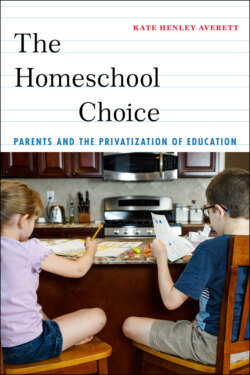Читать книгу The Homeschool Choice - Kate Henley Averett - Страница 12
На сайте Литреса книга снята с продажи.
The Study
ОглавлениеI carried out the research for this project between August 2013 and May 2016. During this time, I conducted a survey of over six hundred homeschooling parents, interviewed forty-six of those parents, and attended five homeschooling conferences and conventions across the state of Texas. The parents I surveyed came from all over the state and represented a wide range of political stances, religious affiliations, and motivations for homeschooling. The survey asked about homeschooling experiences and approaches, motivations for homeschooling, and political and social views, including, for example, views on same-sex marriage, abortion, school prayer, and sex education.
More than half of the parents who responded to my survey said that they were interested in being interviewed for the project as well. Out of these parents, I carefully chose a diverse sample to interview in person. The purpose of these interviews was to elicit the narratives of homeschool parents about how and why they made the decision to homeschool, their homeschooling approaches, and the advantages and disadvantages they see to homeschooling compared to traditional public schooling.26 I selected interview respondents in such a way as to collect as diverse a sample as possible. I was particularly interested in having a representation of various political views (conservative, moderate, and liberal) and degrees of religiosity, and thus attempted to initiate contact with roughly equal numbers of conservative and liberal, and religious and nonreligious, respondents: of the forty-four focal interviewees, one quarter (eleven respondents) identified as politically moderate, while 39% (seventeen respondents) identified as conservative or very conservative, and 36% (sixteen respondents) identified as liberal or very liberal. Half of the sample identified as not very or not at all religious, and the other half as somewhat or very religious.
I also engaged in participant observation at various homeschooling conferences and conventions throughout the period I was carrying out this research. I attended five such events between August 2013 and April 2015: three large, explicitly fundamentalist Christian homeschooling conferences, one small Catholic homeschooling conference, and one small conference of unschoolers—those who engage in “child-led” homeschooling. At these conferences, I acted as a participant observer in order to understand the narratives of homeschooling families as part of a larger set of discourses (collective ways of thinking and talking about a subject that help to organize social life).27 I participated as a regular registrant, attending various talks, workshops, and special events/performances, and “window shopping” among the vendor areas. Attending these events helped me to contextualize the experiences of the parents I interviewed within the broader homeschooling culture.
